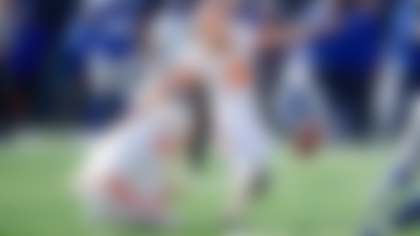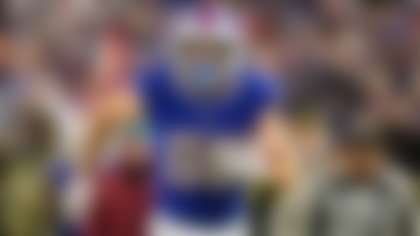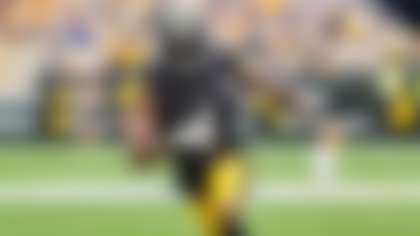Franchise quarterback is the most elusive and essential need in all of pro football. NFL teams are desperate to find one, willing to part with valuable draft capital or invest millions in the hopes of adding this critical piece to the roster. But too often in their pursuit of a top-tier passer, organizations mistake adequate for exceptional, fooling themselves into thinking a middle-of-the-road passer is worthy of being the face of the franchise.
So what is a franchise quarterback, and which teams have had the best run of them? To answer these two questions, we established four simple criteria and applied them to every quarterback since the common-era draft began in 1967, when the AFL and NFL first began drafting together. To qualify, a player must have 48 starts with one team and meet two of the following three requirements:
1) Winning regular-season record.
2) Minimum passer rating of 75.0.
3) At least one Pro Bowl selection.
None of these provisions alone paint a perfect picture, but together, they help to illustrate sustained production at an above-average level. And at the core of what all fans crave from their quarterback is someone who consistently keeps the team competitive and provides a realistic shot at the playoffs. Everything else is gravy.
For every franchise passer teams get right, there are countless others they miss on entirely. That's why we've also identified each organization's biggest QB misstep. Perspective is important, and we should always remember just how bad things can get when dependable quarterback play disappears.
Because we only considered a player's performance from 1967 onward, some notable passers, such as Bart Starr and Don Meredith, aren't included, while others, like Johnny Unitas, only have post-'66 production factored into their franchise QB eligibility.
I'm sure you'll agree with all of the choices below, so I don't expect any disparaging tweets. First up: NFC North.
NOTE: Pro Bowl totals below include AFL All-Star Game selections, while Super Bowl ring totals only include titles won as the team's starting quarterback. The names of franchise QBs who are also their team's current starter are bolded.
Chicago Bears
THE Franchise QB: Jim McMahon
That there's only one Bears quarterback who meets the criteria in the past 52 years is almost unbelievable. McMahon certainly benefited from having an all-time great defense and a legendary running back, but he also made plays when necessary, using both his arm and his legs. His hard-nosed, ultra-competitive mentality melded well with the city and the franchise, similar to Jim Kelly in Buffalo.
Biggest QB misstep: Cade McNown
There are so many to choose from ... trading a first-rounder in '97 for Rick Mirer (who was released 18 months later with a 0:6 TD-to-INT ratio) ... trading up for Rex Grossman in Round 1 of the 2003 draft when Tony Romo went unpicked ... signing a past-his-prime Kordell Stewart that same offseason (he went 2-5 with a 56.8 passer rating). But I think the Cade McNown debacle takes the cake. McNown, whom the Bears picked 12th overall in the 1999 NFL Draft to solve the team's long-running quarterback problem, lasted just two seasons with Chicago (and in the NFL), finishing his pro career with a 3-12 record and a 67.7 passer rating. When you can trade down in the first round and still get your quarterback, warning bells should be going off. Chicago's last first-round pick of the millennium ended up setting an already troubled offense back even further.
Longest QB drought: 1988-present
It's been 31 years since Chicago has featured a true franchise QB, despite many efforts to bring one in. After the McNown mistake, the Bears suffered through a slew of disappointing and uninspiring options, including Stewart, Jonathan Quinn, Craig Krenzel and Rex Grossman before trading for Jay Cutler -- the franchise's all-time leading passer. That's right, Jay Cutler (who didn't qualify due to his 51-51 record and zero Pro Bowl selections with the Bears) is the most prolific quarterback in team history. Mitchell Trubisky has the supporting cast and the coaching staff to replace McMahon's name above. The question remains whether he can be a consistent force for good in an organization that has seen decades of bad at the position.
Detroit Lions
Who qualifies for the Lions?
-- Matthew Stafford (2009-present): 141 starts | 66-75 | 1 Pro Bowl | 88.4 passer rating
-- Bill Munson (1968-1975): 48 starts | 24-21-3 | 0 Pro Bowls | 75.2 passer rating
THE franchise QB: Matthew Stafford
The Lions came dangerously close to not having a single franchise QB, with Stafford's lone Pro Bowl saving him and .3 points on Munson's passer rating keeping him eligible. Stafford, the first overall pick in 2009, has often been really good -- and at times, great -- during his 10 pro seasons. (Stafford would have two Pro Bowls on his resume if not for monster seasons from Aaron Rodgers and Drew Brees in 2011.) In addition, after an injury-riddled beginning to his pro career, he's been ultra dependable for a franchise that has been anything but consistent, starting every game for the past eight seasons. His overall losing record and 0-3 mark in the playoffs are troublesome, but he's by far the best quarterback in Lions history. And at just 31 years old, he still has plenty of time to answer some of the criticisms that have dogged him over a productive career.
Biggest QB misstep: Andre Ware
This one was really hard. You could make a fair case for Joey Harrington (drafted in 2002) or Chuck Long (1986), both former first-round picks who ended their Lions careers with losing records. But I went with Ware because, within a year of drafting him No. 7 overall in 1990, Detroit had all the skill pieces in place (including Barry Sanders and Herman Moore) to be downright nasty on offense for years to come. But Ware never acclimated to the NFL, starting just six games in four seasons and watching from the sideline as Rodney Peete and Erik Kramer split time under center. In fairness to Detroit, it's not like many of the other QB prospects in Ware's, Harrington's or Long's draft classes developed into superstars.
Longest QB drought: 1976-2008
Detroit, despite not having a ton of consistency at the position, did get some quality one-off years from its quarterbacks, most notably Scott Mitchell. In 1995, Mitchell threw a career-best 32 touchdown passes and helped the Lions boast the NFL's No. 1 offense. But these spurts of success from their signal-callers came to define the team, and the lack of a true franchise quarterback (until Stafford's arrival) meant Detroit was forced to turn to guys like Ty Detmer, Mike McMahon, Charlie Batch and Eric Hipple.
Green Bay Packers
Who qualifies for the Packers?
-- Aaron Rodgers (2005-present): 158 starts | 100-57-1 | 7 Pro Bowls | 103.1 passer rating | 2 MVPs | 1 SB ring
-- Brett Favre (1992-2007): 253 starts | 160-93 | 9 Pro Bowls | 85.8 passer rating | 3 MVPs | 1 SB ring
THE franchise QB: Brett Favre
Rodgers might very well overtake Favre by the time his career is over, but for right now, No. 4 remains the Packers' best QB1 of the common era. Favre currently has more MVPs, first-team All-Pros, Packers starts and Pro Bowl selections than Rodgers -- and he owns a higher regular-season winning percentage. Favre was the epitome of durability, starting 275 consecutive games (including playoffs) for the Pack and posting only one losing record in 16 seasons. And while Rodgers has set the NFL world on fire with multiple successful Hail Mary attempts, Favre finished his Packers career with nearly twice as many game-winning drives (37 to 20) as Rodgers. Look, nearly every fan base would happily claim either of these guys as their best franchise QB of all time (I know Bears fans would), and Rodgers has the potential to finish his NFL career as a top-five QB of all time. But that's looking into the future. Based on the totality of their Packer achievements to this point, Favre's epic level of excellence over such an extended period of time wins out.
Packers legend Bart Starr, who passed away Sunday, would surely have been in this discussion, but he played most of his Hall of Fame career before the common-draft era, and thus did not meet the criteria outlined in the intro.
Biggest QB misstep: Randy Wright
Hard to feel too bad for a fan base that lucked out with Starr, Favre and Rodgers at quarterback. But the Packers faithful who cheered on the Green Bay teams of the mid-'80s did endure a five-year interval during which a sixth-round draft pick out of Wisconsin lost 25 of his 32 starts, including 12 in the 1986 season. That quarterback would finish his Packers career (and his run in the NFL, for that matter) with a 53.8 completion percentage, a 31:57 TD-to-INT ratio and a 61.4 passer rating. His name is Randy Wright. Bears, Lions and Vikings supporters must never let his legacy fade.
UPDATE: I have to admit my own miscue here. A reader kindly pointed out that I should've mentioned the Packers' disastrous trade for 34-year-old John Hadl in 1974, which has every right to compete with (and overtake) Wright's 32-start calamity for the worst QB move in franchise history. Green Bay sent two first-rounders, two second-rounders and a third-rounder to the Rams for Hadl, who went on to throw nine TD passes against 29 interceptions in just 19 starts for the team. Less than two years after the mega-trade, the Packers packaged Hadl with cornerback Ken Ellis, a fourth-rounder and a third-rounder for Houston Oilers passer Lynn Dickey. Dickey would go on to start 101 games for Green Bay, so it wasn't all bad. Though his record with the Packers (43-56-2) illustrates just how dicey things got for Green Bay in the ensuing years.
Longest QB drought: 1972-1991
Although Starr's final few years in Green Bay were a far cry from his run with legendary coach Vince Lombardi (which resulted in three NFL championships and two Super Bowls), he was at least still a household name who provided Green Bay with some credibility under center. But after his retirement at the end of the '71 season, the Packers made just two playoff appearances in the next 21 years. Dickey authored some quality offensive seasons in the early '80s, but besides him and "The Majik Man" Don Majkowski -- who was never able to duplicate his 1989 Pro Bowl season -- Packers fans were subjected to starts from Alan Risher, Anthony Dilweg, Hadl and Wright, to name a handful, before Favre began his reign of terror over the NFC Central/North.
Minnesota Vikings
THE franchise QB: Fran Tarkenton
Tarkenton's accomplishments in his first go-around with the Vikings (1961-66) aren't applicable to this exercise, but he's more well known for the feats he achieved in his Vikings return, anyway. After re-joining the team in 1972 following a five-year stint with the Giants, Tarkenton guided Minnesota on an incredible run that included six straight postseason trips and three Super Bowl berths in four years. Though the Vikings never captured football's ultimate trophy during that span -- and they still haven't -- no other QB in franchise history provided as much stability and sustained winning as he did. Had Randall Cunningham's 1998 squad finished off the Falcons in the NFC Championship Game and finally captured a Super Bowl title for Minnesota, I wonder if his Vikings tenure might've turned out differently. Would his name be the fourth on the Vikes' list?
Biggest QB misstep: Christian Ponder
Ponder scored some success as an NFL quarterback, winning 10 games in 2012, but he never materialized into the franchise passer the Vikings expected when they drafted him 12th overall in 2011. Ponder, like EJ Manuel with the Bills (drafted 16th overall in 2013), is somewhat a victim of his draft status; had he been picked on Day 2 or 3, like he probably should've been, he wouldn't have had the burden of franchise-QB expectations weighing on his shoulders. It's rare for a team to use a first-round pick on a quarterback while a former first-rounder still on his rookie deal sits on the team's roster (rare, but not unthinkable). However, after just three seasons, the franchise had seen enough of Ponder to trade back into the first round of the 2014 draft to take Teddy Bridgewater. Ponder started just one more game for Minnesota before his NFL career came to an end.
Longest QB drought: 2006-present
The Vikings sure hope their current quarterback, Kirk Cousins, plays like the franchise passer they paid him to be. Cousins is in a really interesting spot. He could realistically make a run at Tarkenton's place atop the Vikings' franchise QB ranks; he could also find himself replacing Ponder as the team's biggest miscue. With a roster ready to win now, Cousins' Vikings legacy has an incredibly high ceiling and a painfully low floor. At the very least, he's been a far more effective (and expensive) option than Brooks Bollinger, Gus Frerotte, Tarvaris Jackson or Donovan McNabb, all of whom helped bridge the gap between Culpepper and today.
Follow Ali Bhanpuri on Twitter @AliBhanpuri.












